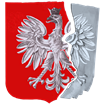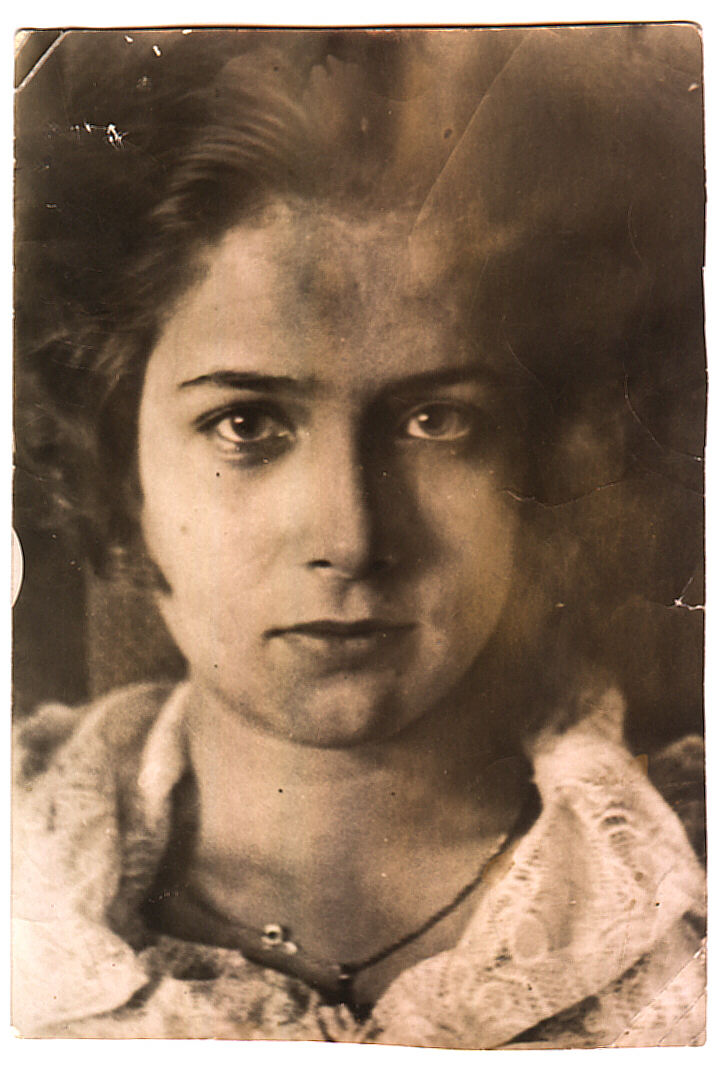Part One – Poland


Janina Sulkowska, 1934

Rare Glimpses
Once after an inspection I noticed the “Judas” in my cell had not been completely closed from the outside. I screwed up my courage and peeked outside. After some time I glimpsed a prisoner being let back into her cell, next door to me. For a fleeting moment I saw a sorrowful face–It was Teresa! And she was just on the other side of the wall.
I didn’t yet know the “jail-alphabet” by which prisoners communicated by knocking on walls, nor did Teresa, but it was she who first made contact with me. She started by tapping out the opening melody from a school song that we had often sung with friends. I answered back with the next verse, and thus we regularly began to exchange popular songs. It gave me a huge lift to be able to communicate with Teresa and to know that she was alive. I prayed that it
helped to keep her spirits up as well.
For a second time the “Judas” was left partially open by a sloppy guard. A distinctive clack-clack-clack echoed along the hall–a sound I had heard before, but which puzzled me. Now I had the chance to see. There being marched off for interrogation was Pius Zaleski. He was wearing an old white shirt, and on his feet were bandages, filthy and unchanged for some time. I recalled his ill-fated crossing of the Soviet-Nazi border back in January when he and Bronek were abandoned by their guide and suffered severe frostbite–but that was months ago and his condition was still serious. Probably the NKVD probably let it deliberately fester. I also recalled Vinokur trapping me with his question regarding Pius’s health. Pius had on wooden clogs which were the only footgear that could fit over his swollen feet and bandages. Those clogs were the source of the clattering sound that had puzzled me, and now whenever I heard it echoing, I knew that it was Pius.
Being alone, I inevitably suffered with negative thoughts which I accepted as unavoidable. I brooded over the fate of my family and homeland. The worst was not knowing the fate of my loved ones. I often thought about my best friend from Krzemieniec whose fate was unknown. Lidia Skrypnikowna and I had been inseparable from high school through university and we shared the modest goal of making the Polish educational system the best in the world. During my arrest a postcard from her had been confiscated. In tiny print she had added: “I believe in Werba!” which was a reference to a new university she had worked so hard to help establish. But to the NKVD it was suspicious, and despite my pleadings that she was not involved, Lidia disappeared. I would never find out her fate.
I was shattered by the fact that our organization had achieved so little, and how easily the NKVD arrested us. Our groups had been carefully organized across Wolyn where membership was screened (and included many women) and competent leaders were selected. We had decided to avoid armed conflict as it would have been suicidal at that time–but we had a cache of arms. We regularly reported to ZWZ headquarters in Warsaw, and I was proud of my part in carrying messages and communications. A secret transmitting radio station was set up that talked with Warsaw and received news from Paris, London and Moscow. Weapons, uniforms, medical supplies, were hidden in secret places while Colonel Majewski arrived with his explosives and sappers. But when Jaukub Hoffman was arrested, everything started to fall apart. I realized that we had underestimated the cunning and ruthless NKVD whose tentacles reached everywhere and assisted by collaborators.
The Devils
One night I was awakened and marched to the depths of the jail. Panic gripped me as the guard breathed down my neck, and I prepared myself once more for a bullet in the head. I only hoped that it would be quick and painless. But I was delivered to a pair of waiting devils–that was my first reaction when the guard pushed me through the door of a cell no bigger than mine. Two NKVD officers sat behind a desk. And they were truly diabolical in appearance. One a Georgian was dark with piercing eyes and hair that stood up, resembling horns. I immediately called him the Devil. He was the talkative one. The other possessed Mongolian features and naturally became the Mongol.
The Devil motioned for me to sit down. For several minutes the pair intently observed me without saying a thing–and then both started to laugh and guffaw at a joke known only to them. I stared back in bemusement. The Devil then removed a photo from his file–of me from my days at Warsaw University, which had been taken from my home when I was arrested. The Devil and the Mongol would pass it back and forth, study it, and then look at me. Then they’d laugh and shake their heads at the change in my appearance.
“What a movie star! But what has happened?” the Devil clucked, sadly looking at my photo while the Mongol sighed. And indeed after months of interrogations and near-starvation I was not the same person in looks.
The pair then went over ground long-covered by Vinokur and Titov: details of schools, teachers and students etc. The Devil then asked me if I knew Stefan Czarnocki. I replied that he was, or had been, the director of Krzemieniec Lyceum. The same was asked of me regarding other professors and figures from Krzemieniec whom I knew, some on a personal basis. The Devil and the Mongol shook their heads one last time at my deteriorating movie-star looks, and I was dismissed.
What in the Devil where they after? The NKVD already had grabbed many of the people, including Czarnocki, who would vanish without a trace in the USSR. They were in fact confirming and adding to their list of citizens for execution or deportation. But in two months, Hitler would turn on his Soviet ally and Krzemieniec would see the Germans also hunting these citizens. In the first days of Nazi rule, 50 Poles and 200 Jews would be murdered, including teachers and students who were “liberated” from Soviet jail–only to be then executed by the Nazis. The Soviets still managed to massacre hundreds in Krzemieniec jail even as the Germans neared, or deported them. Other survivors would be then taken as slave-labour to Germany or were forced to face a genocidal campaign waged by Ukrainian nationalists. In the Clutches of the NKVD
I returned to my solitary prison routine. Daily exercise and scrubbing the floors combined with literary endeavors including composing my own poetry. I’d write a few lines on the window sill or blanket with soap (making sure I wasn’t observed); I’d then memorize the lines, rub them out, and continue on. Calling on my Muse, I was sometimes answered with the screams of tortured people.
In the middle of July, two months into solitary, Major Vinokur paid me a second visit. “What still all alone?” he declared in mock-shock.
I was unbowed and felt stronger than when I had first been locked up alone–and after seeing the barbaric things this man had done to my friends, I only felt hate for him.
“Such a life is to my liking,” I replied. “In fact it’s heaven!”
The very next day I was transferred to a nearby cell containing two other women.
Christopher Jacek Gladun was born in 1951 and grew up in Canada to where his family emigrated from England as displaced persons. Sadly, Chris died in Toronto in March 2003. He held a diploma in Journalism from the Niagara College and a BA in Polish Language & Literature from the University of Toronto. Chris also acted as interviewer and researcher for the documentary film “Rescued From Death in Siberia”.
This content is now maintained by the Kresy-Siberia Group, which Chris was a charter member of and which is taking his website and his research work forward.